Indexing non-HTML documents
You can use Crawler to index documents such as .pdf’s and .doc’s. Documents are transformed into HTML by a dedicated Tika Server.
Tika
Most documents have complex formats and are not structured as HTML pages.
To allow the crawler to index documents that are formatted differently, we rely on a Tika Server that is maintained by Apache. The server extracts a document’s content and transforms it into a basic HTML file.
Limitations
Because it’s very difficult to translate non-HTML documents into HTML, there are limitations to what can be done:
- A PDF can easily break if it is exported with an unknown font.
- The produced HTML has little semantic value, which will make good relevancy hard to achieve.
- Document indexing is slower than classic HTML indexing.
- Language detection/information is currently not available.
Supported filetypes
- Associated extension:
.pdf fileTypesToMatch:pdf
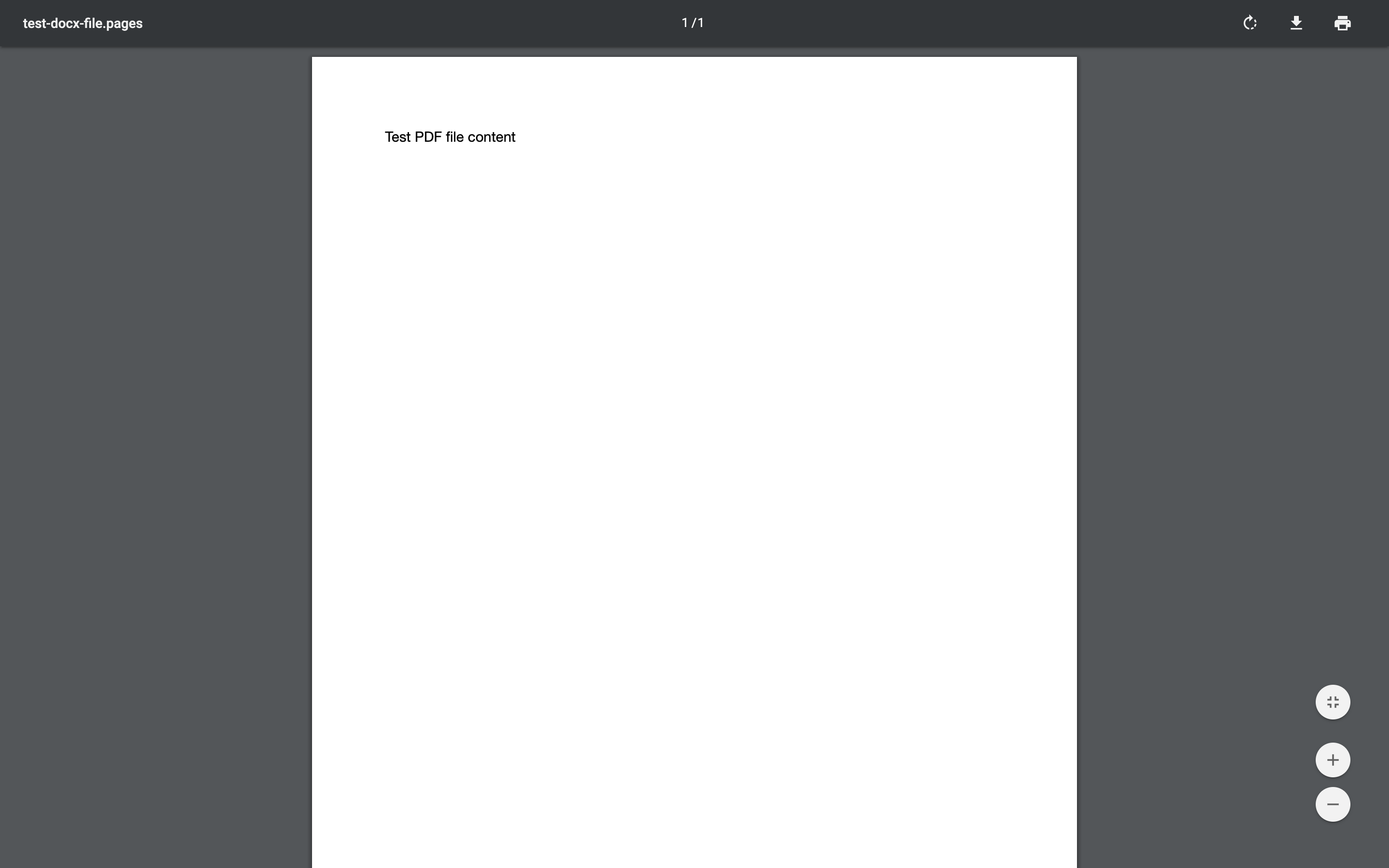
For example, given the .pdf file in the image above, the Tika server will expose the following HTML which your crawler then passes to your recordExtractor.
The metadata presented here is not guaranteed to appear on every document.
1
2
3
4
5
6
7
8
9
10
11
12
13
14
15
16
17
18
19
20
21
22
23
24
25
26
27
28
29
30
31
32
33
34
35
36
37
38
39
40
41
42
43
44
45
<html xmlns="http://www.w3.org/1999/xhtml">
<head>
<meta name="date" content="2018-07-17T13:35:40Z"/>
<meta name="pdf:PDFVersion" content="1.3"/>
<meta name="pdf:docinfo:title" content="test-docx-file.pages"/>
<meta name="xmp:CreatorTool" content="Pages"/>
<meta name="access_permission:modify_annotations" content="true"/>
<meta name="access_permission:can_print_degraded" content="true"/>
<meta name="dcterms:created" content="2018-07-17T13:35:40Z"/>
<meta name="Last-Modified" content="2018-07-17T13:35:40Z"/>
<meta name="dcterms:modified" content="2018-07-17T13:35:40Z"/>
<meta name="dc:format" content="application/pdf; version=1.3"/>
<meta name="Last-Save-Date" content="2018-07-17T13:35:40Z"/>
<meta name="pdf:docinfo:creator_tool" content="Pages"/>
<meta name="access_permission:fill_in_form" content="true"/>
<meta name="pdf:docinfo:modified" content="2018-07-17T13:35:40Z"/>
<meta name="meta:save-date" content="2018-07-17T13:35:40Z"/>
<meta name="pdf:encrypted" content="false"/>
<meta name="dc:title" content="test-docx-file.pages"/>
<meta name="modified" content="2018-07-17T13:35:40Z"/>
<meta name="Content-Type" content="application/pdf"/>
<meta name="X-Parsed-By" content="org.apache.tika.parser.DefaultParser"/>
<meta name="X-Parsed-By" content="org.apache.tika.parser.pdf.PDFParser"/>
<meta name="meta:creation-date" content="2018-07-17T13:35:40Z"/>
<meta name="created" content="Tue Jul 17 13:35:40 UTC 2018"/>
<meta name="access_permission:extract_for_accessibility" content="true"/>
<meta name="access_permission:assemble_document" content="true"/>
<meta name="xmpTPg:NPages" content="1"/>
<meta name="Creation-Date" content="2018-07-17T13:35:40Z"/>
<meta name="access_permission:extract_content" content="true"/>
<meta name="access_permission:can_print" content="true"/>
<meta name="producer" content="Mac OS X 10.13.5 Quartz PDFContext"/>
<meta name="access_permission:can_modify" content="true"/>
<meta name="pdf:docinfo:producer" content="Mac OS X 10.13.5 Quartz PDFContext"/>
<meta name="pdf:docinfo:created" content="2018-07-17T13:35:40Z"/>
<title>test-docx-file.pages</title>
</head>
<body>
<div class="page">
<p/>
<p>Test PDF file content</p>
<p/>
</div>
</body>
</html>
Word document
- Associated extensions:
.doc,.docx fileTypesToMatch:doc
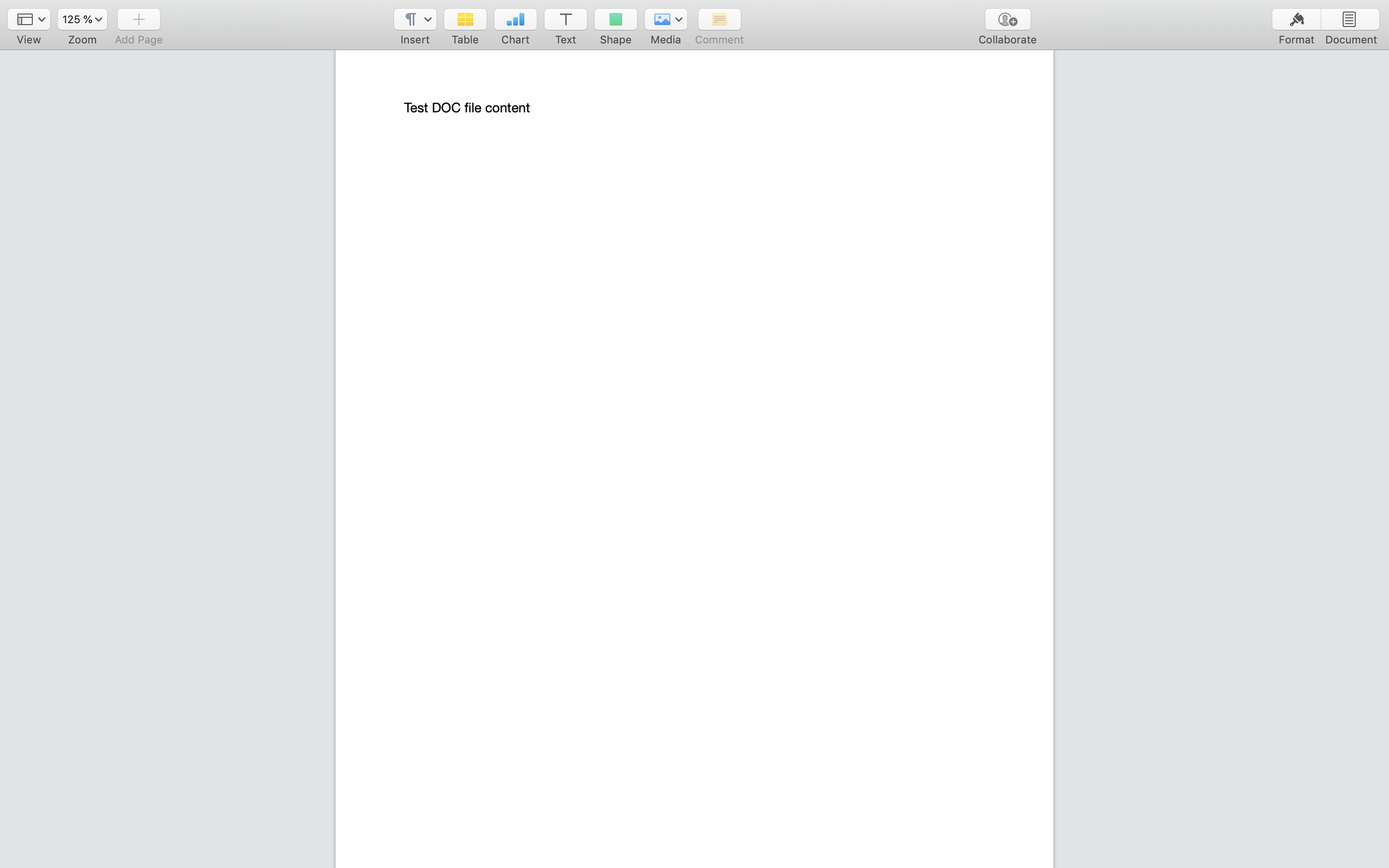
For example, given the .doc file in the image above, the Tika server will expose the following HTML, which your crawler then passes to its recordExtractor.
The metadata presented here is not guaranteed to appear on every document.
1
2
3
4
5
6
7
8
9
10
11
12
13
14
<html xmlns="http://www.w3.org/1999/xhtml">
<head>
<meta name="X-Parsed-By" content="org.apache.tika.parser.DefaultParser"/>
<meta name="X-Parsed-By" content="org.apache.tika.parser.microsoft.OfficeParser"/>
<meta name="Content-Type" content="application/msword"/>
<title>
</title>
</head>
<body>
<div class="header"/>
<p class="body">Test DOC file content</p>
<div class="footer"/>
</body>
</html>
OpenDocument text
- Associated extension:
.odt fileTypesToMatch:odt
Excel spreadsheet
- Associated extensions:
.xls,.xlsx fileTypesToMatch:xls
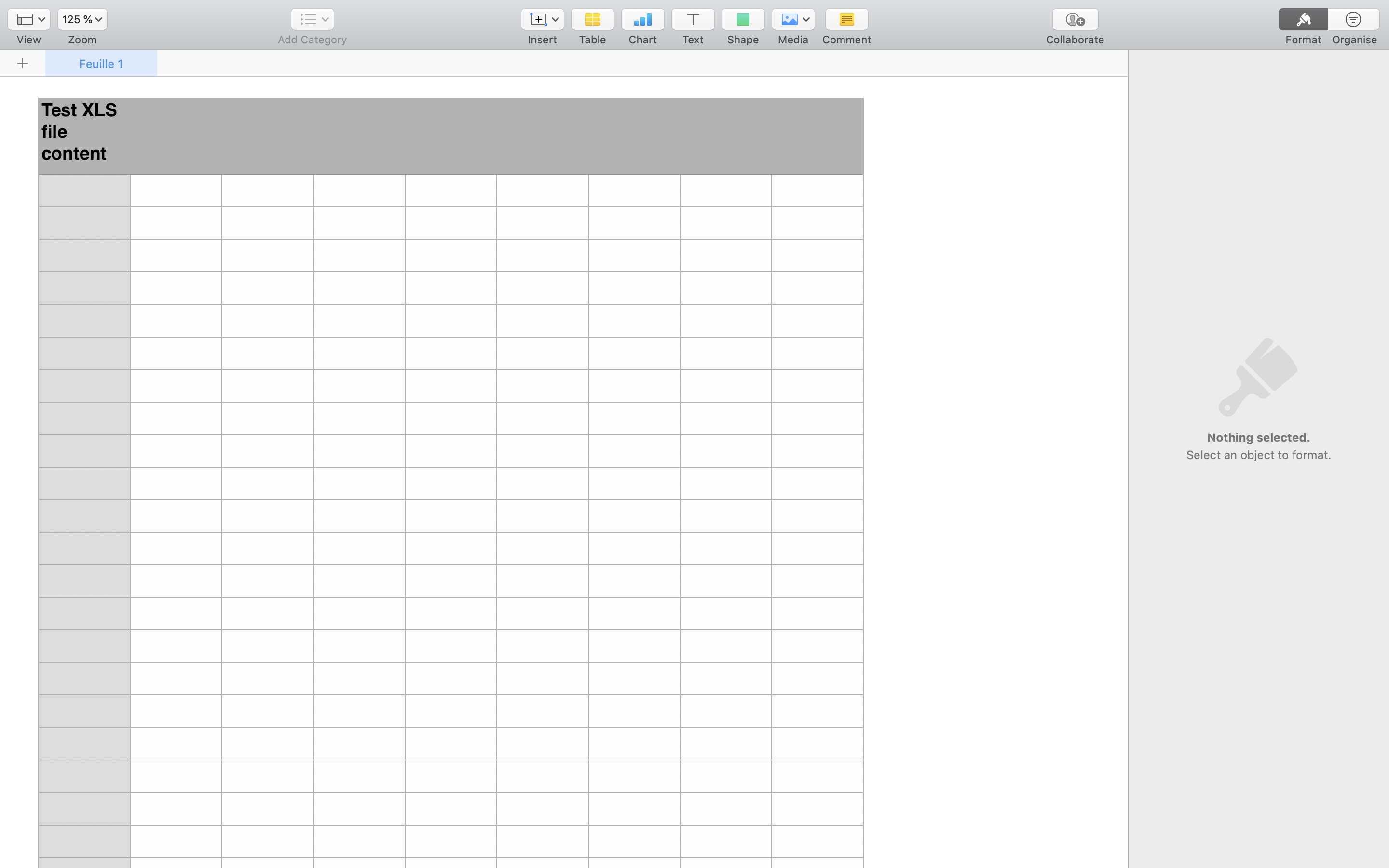
For example, given the .xls file in the image above, the Tika server will expose the following HTML, which your crawler then passes to its recordExtractor.
The metadata presented here is not guaranteed to appear on every document.
1
2
3
4
5
6
7
8
9
10
11
12
13
14
15
16
17
18
19
20
21
22
<html xmlns="http://www.w3.org/1999/xhtml">
<head>
<meta name="X-Parsed-By" content="org.apache.tika.parser.DefaultParser"/>
<meta name="X-Parsed-By" content="org.apache.tika.parser.microsoft.OfficeParser"/>
<meta name="Content-Type" content="application/vnd.ms-excel"/>
<title>
</title>
</head>
<body>
<div class="page">
<h1>Feuille 1</h1>
<table>
<tbody>
<tr>
<td>Test XLS file content</td>
</tr>
</tbody>
</table>
<div class="outside">&C&"Helvetica,Regular"&12&K000000&P</div>
</div>
</body>
</html>
OpenDocument spreadsheet
- Associated extension:
.ods fileTypesToMatch:ods
PowerPoint document
- Associated extensions:
.ppt,.pptx fileTypesToMatch:ppt
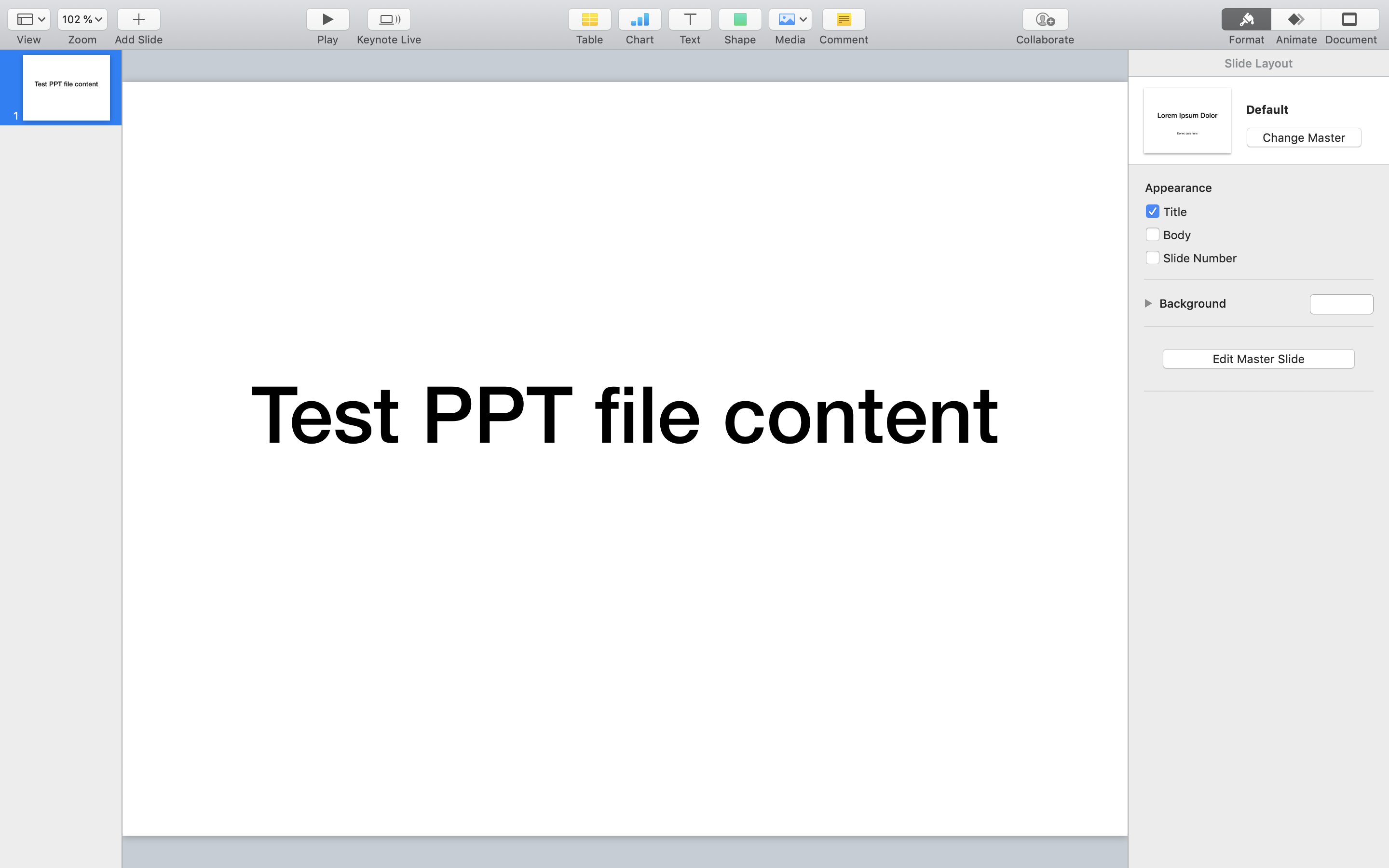
For example, given the .ppt file in the image above, the Tika server will expose the following HTML, which your crawler then passes to its recordExtractor.
The metadata presented here is not guaranteed to appear on every document.
1
2
3
4
5
6
7
8
9
10
11
12
13
14
15
16
17
18
19
20
21
<html xmlns="http://www.w3.org/1999/xhtml">
<head>
<meta name="X-Parsed-By" content="org.apache.tika.parser.DefaultParser"/>
<meta name="X-Parsed-By" content="org.apache.tika.parser.microsoft.OfficeParser"/>
<meta name="Content-Type" content="application/vnd.ms-powerpoint"/>
<title>
</title>
</head>
<body>
<div class="slideShow">
<div class="slide">
<div class="slide-master-content"/>
<div class="slide-content">
<p>Test PPT file content</p>
<p/>
</div>
</div>
<div class="ocr"/>
</div>
</body>
</html>
OpenDocument presentation
- Associated extension:
.odp fileTypesToMatch:odp
Email documents
- Associated extension:
.msg fileTypesToMatch:email
The file type email includes all documents related to electronic mail, currently the Crawler supports Outlook Mail Message (.msg).
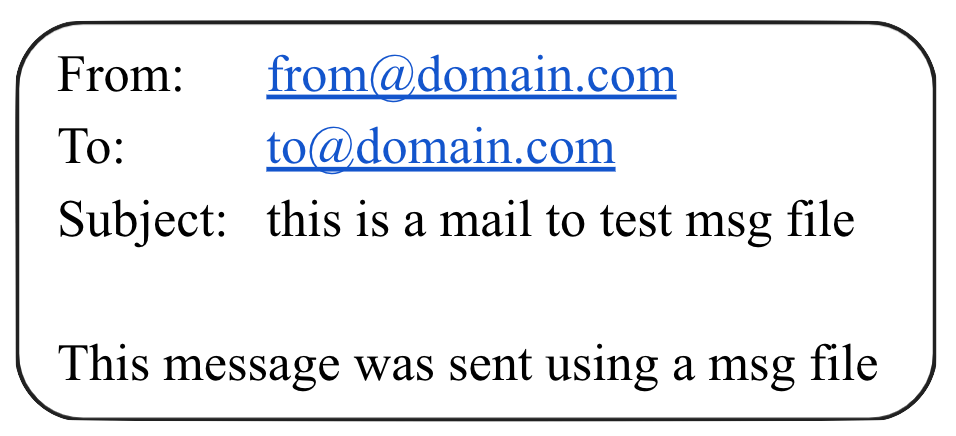
The Tika server converts the example email into the following HTML:
The metadata presented here isn’t guaranteed to appear on every document.
1
2
3
4
5
6
7
8
9
10
11
12
13
14
15
16
17
18
19
20
21
22
23
24
25
26
27
28
29
30
31
32
33
34
35
36
37
38
39
40
41
42
43
44
45
46
47
48
49
50
51
52
53
54
55
56
57
<html xmlns="http://www.w3.org/1999/xhtml">
<head>
<meta name="date" content="2017-06-01T15:24:31Z" />
<meta name="Message:To-Email" content="to@domain.com" />
<meta name="dc:description" content="this is a mail to test msg file" />
<meta name="subject" content="this is a mail to test msg file" />
<meta name="dc:creator" content="from@domain.com" />
<meta name="Message:From-Email" content="from@domain.com" />
<meta name="dcterms:created" content="2017-06-01T15:24:31Z" />
<meta name="Message-To" content="to@domain.com" />
<meta name="dcterms:modified" content="2017-06-01T15:24:31Z" />
<meta name="Last-Modified" content="2017-06-01T15:24:31Z" />
<meta name="Message-Recipient-Address" content="to@domain.com" />
<meta name="Message:Raw-Header:X-Unsent" content="1" />
<meta name="Message:Raw-Header:Subject" content="this is a mail to test msg file" />
<meta name="meta:mapi-message-class" content="NOTE" />
<meta name="Message:To-Display-Name" content="to@domain.com" />
<meta name="Last-Save-Date" content="2017-06-01T15:24:31Z" />
<meta name="Message:Raw-Header:MIME-Version" content="1.0" />
<meta name="meta:save-date" content="2017-06-01T15:24:31Z" />
<meta name="dc:title" content="this is a mail to test msg file" />
<meta name="Message:Raw-Header:Message-ID" content="<c58b1b52f61f4789ba40339c6e993440>" />
<meta name="modified" content="2017-06-01T15:24:31Z" />
<meta name="Content-Type" content="application/vnd.ms-outlook" />
<meta name="X-Parsed-By" content="org.apache.tika.parser.DefaultParser" />
<meta name="X-Parsed-By" content="org.apache.tika.parser.microsoft.OfficeParser" />
<meta name="creator" content="from@domain.com" />
<meta name="Message:Raw-Header:From" content="from@domain.com" />
<meta name="meta:author" content="from@domain.com" />
<meta name="meta:creation-date" content="2017-06-01T15:24:31Z" />
<meta name="meta:mapi-from-representing-email" content="from@domain.com" />
<meta name="Creation-Date" content="2017-06-01T15:24:31Z" />
<meta name="Message-Cc" content="" />
<meta name="Message-Bcc" content="" />
<meta name="meta:mapi-from-representing-name" content="from@domain.com" />
<meta name="Message:Raw-Header:To" content="to@domain.com" />
<meta name="Message:From-Name" content="from@domain.com" />
<meta name="Author" content="from@domain.com" />
<meta name="Message-From" content="from@domain.com" />
<meta name="Message:To-Name" content="" />
<title>this is a mail to test msg file</title>
</head>
<body>
<h1>this is a mail to test msg file</h1>
<dl>
<dt>From</dt>
<dd>from@domain.com</dd>
<dt>To</dt>
<dd>to@domain.com</dd>
<dt>Recipients</dt>
<dd>to@domain.com</dd>
</dl>
<div class="message-body">
<p>This message was sent using a msg file </p>
</div>
</body>
</html>
Enabling document extraction
To enable document extraction, add the fileTypesToMatch setting to at least one of your crawler’s actions.
The available fileTypesToMatch are:
htmlfor web pages. This is the default when nofileTypesToMatchparameter is presentpdffor PDF documentsdoc,xlsandpptfor Microsoft Office documentsodt,odsandodpfor Open documentsemailfor electronic mail documents
When this setting is used and a document is encountered, the parameter $ is assigned the transformed HTML of document. The file’s type is stored in the fileType parameter of your recordExtractor.
1
2
3
4
5
6
7
8
9
10
11
12
13
({
[...]
actions: [
{
indexName: 'crawler-example',
pathsToMatch: ['https://www.example.com/**'],
fileTypesToMatch: ['pdf', 'doc'],
recordExtractor: ({ url, $, fileType }) => {
console.log($.html(), fileType);
}
},
]
});
You can checkout our Github repository of sample crawler configurations for an example of a configuration file that implements document extraction.
